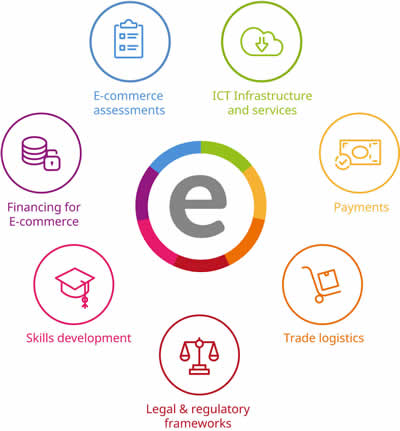In just one year, the UNCTAD-led eTrade for all initiative has delivered impressive results, many of which took center stage at E-Commerce Week, the main global forum on the development opportunities and challenges of the digital economy.
First unveiled during UNCTAD’s last ministerial conference, held in Nairobi in July 2016, eTrade for all become operational on 25 April 2017 when the online platform was launched.
Since then, the initiative has been delivering on its promise to make e-commerce more inclusive, by bringing partners closer and offering increased and more transparent opportunities for collaboration.
The most visible outcome has been its major spin-off, the UNCTAD Rapid eTrade Readiness Assessments, which diagnose the opportunities and challenges for e-commerce in least developed countries, providing a road map for moving ahead.
At total of seven assessments have already been carried out, and the latest three – for Liberia, Lao Peoples’ Democratic Republic, and Myanmar – were showcased during the opening session of E-Commerce Week.

Liberia’s assessment marked an important milestone because it was the first one done in Africa, home to most of the world’s least developed countries.
“Each assessment, and this is the beauty of the exercise, includes a list of concrete recommendations for governments,” UNCTAD Deputy Secretary-General Isabelle Durant said after presenting the reports.
Friends with benefits
Also noteworthy is the impressive growth of the list of organizations that are official eTrade for all partners, which now sits at 29.
“As an old African proverb says, ‘If you want to go fast, you can go alone. But if you want to go far, you have go together’,” UNCTAD Secretary-General Mukhisa Kituyi said when he first presented eTrade for all in Nairobi.
A total of 21 eTrade for all partners organized sessions during E-Commerce Week, which attracted more than 1,200 participants from over 110 countries and more than 180 private companies.
In fact, almost half of the 60 or so sessions during the week were led by at least one eTrade for all partner.
Piecing the puzzle together
The novelty of eTrade for all is that it pieces together the fragmented approach organizations may feature in their work on e-commerce.
“Many organizations, including UNCTAD, are already contributing to increased e-commerce uptake. However, current efforts are highly fragmented and of insufficient scale,” Dr. Kituyi said when he unveiled the initiative. “Seizing the opportunities of e-commerce requires a much more concerted approach.”
By connecting those in need of assistance with those that can provide it, and by offering a clearer picture of countries' needs to donors, eTrade for all is making e-commerce development work more effective.
During E-Commerce week, the initiative also unveiled its newest tool, called MyeT4a. This private collaborative space will allow for even closer interaction among partners and potential beneficiaries.
And improved effectiveness is key to increasing e-commerce uptake in many countries, especially the least developed, so that their citizens can also benefit from the huge opportunities offered by the $26 trillion industry, according to UNCTAD’s latest estimates.
While 60-80% of Europeans already shop online, in the world’s 47 least developed countries the share is still typically below 2%.


